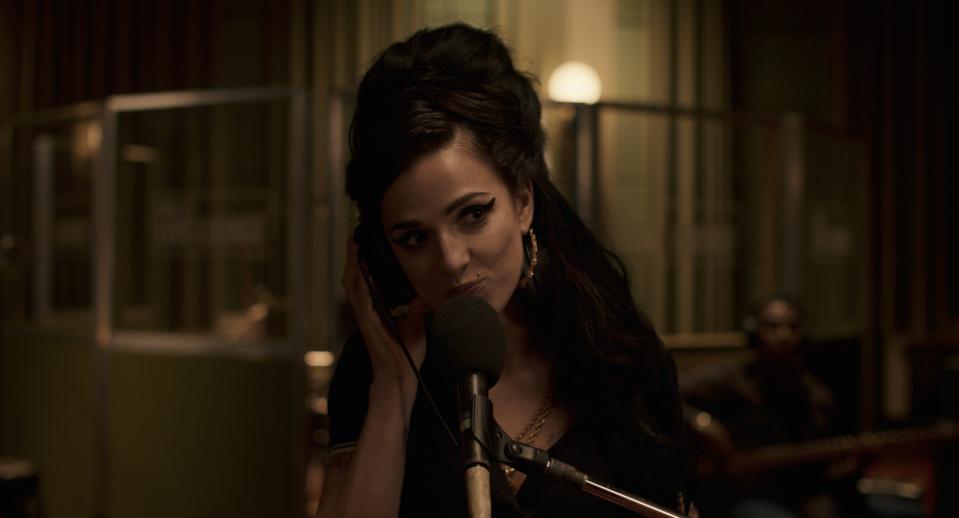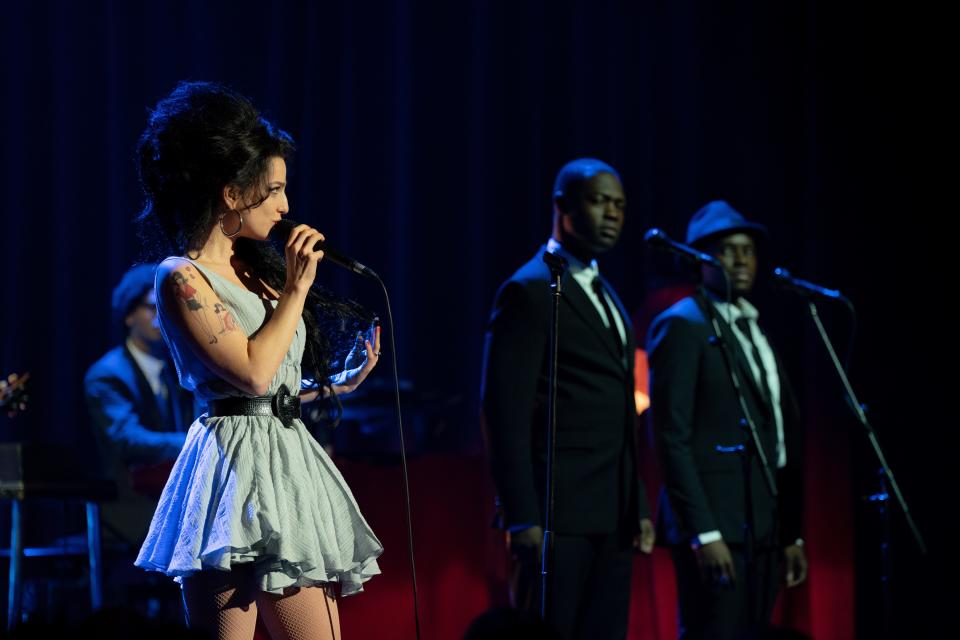'Back to Black': Marisa Abela suits up to uncannily portray Amy Winehouse in 2024 movie
Filmmaker Sam Taylor-Johnson was eager to cast British actress Marisa Abela as ill-fated singer Amy Winehouse in her biopic “Back to Black” (in theaters Friday). Then she got some shocking news.
Abela didn’t sing.
“She said to me, ‘By the way, how much singing is there in this movie?’ ” Taylor-Johnson recalls with a laugh. “I said, ‘Well, quite a lot.’ ”
But the director (“Nowhere Boy”) figured if Abela, 27, could “focus on embodying Amy on a soul level,” then lip-syncing to Winehouse’s famously unique voice would take care of the rest.
In the end, that wasn’t necessary. Thanks to incessant work with a vocal coach, Abela wound up mimicking Winehouse so well that even diehard fans will be hard-pressed to tell the two apart.

“I had no sense of my own voice, so I could become a chameleon,” says Abela. “Amy had one of the most distinctive voices ever, so I had to listen hard to her influences and patterns in order to get close.”
Abela did the work. The Royal Academy of Dramatic Art graduate ? who played Yasmin in HBO's "Industry" and Teen Talk Barbie in "Barbie" ? listened to Winehouse's hits as a preteen, but dove in when she landed this role, moving to Camden, Winehouse's home turf, and frequenting her old nightlife haunts. She even lost weight, carefully, to play drug-addled Amy.
"I was a big Amy fan, but I was young," she says. " 'Valerie' was my song in childhood. But as an adult woman, I can truly understand what is behind songs like 'Wake Up Alone.' My respect for her now, as an artist and songwriter, is immense."
Her uncanny vocal resemblance makes “Back to Black” – also the title of Winehouse’s most iconic album – a compelling two hours. But at its core, the movie aims to serve less as a greatest hit vehicle and more as a means to understand Winehouse’s tragic life.
The child of divorce, Winehouse poured her conflicted emotions into songwriting. A popular singer at London neighborhood pubs, Winehouse had by age 19 already been signed to Simon Fuller’s 19 Management, the same outfit that shot the Spice Girls to fame. A year later, in 2003, she released her debut album, “Frank.”
Seven years later, the six-time Grammy winner would be dead from alcohol poisoning.
What happened in those intervening years is what “Back to Black” explores with unflinching candor. Mostly, it is the star-crossed lovers story of Winehouse and Blake Fielder-Civil (Jack O'Connell), whom she married in 2007.

Their relationship was passionate, volatile and inextricably linked to the abuse of drugs and alcohol. Nevertheless, Winehouse’s commitment never flagged. Eventually, his did.
After a stint in rehab during a jail sentence, Fielder-Civil broke off with Winehouse and had a baby with another woman, just as his ex was also finally sober and now world-famous thanks to "Rehab," the ironic global hit off “Back to Black."
Emotionally undone by his new life, Winehouse spiraled again. Eventually, her body gave out.
While plenty of media accounts and a thorough Winehouse documentary (2015’s “Amy”) paint Fielder-Civil and Amy’s cab-driving father Mitch (Eddie Marsan) as toxic forces, Taylor-Johnson decided to view both differently.
“It was clear to me that I had to look at Blake and her father with love because I needed the audience to see what Amy saw in them,” she says.
Taylor-Johnson met with Winehouse’s parents while preparing for the film, although she did not need their approval to make it. During one meeting, she asked Amy's mother, Janis Winehouse-Collins (Juliet Cowan), if she liked her former son-in-law.

“She answered, ‘No, but I didn’t not like him, either.’ ... He showed (Amy) love, and that was important to Janis,” she says.
As for Mitch Winehouse, there is a scene in the movie where, after taking over Amy’s career, he is implored by family members to get his daughter into rehab. He rebuffs the request.
“I wanted people to think more broadly about what it really might be like to parent a child with addiction,” says Taylor-Johnson. “Do you turn a blind eye, hoping that by performing, Amy rediscovers her love of life? Or do you intervene? It is complicated. It’s easy to just say, ‘Who’s to blame?’ ”
Taylor-Johnson says that while Winehouse's parents haven't told her what they think of her film, they have requested numerous screenings for family and friends. "I think they've warmed to it," she says.
For her part, Abela also met with the Winehouse family. “My impression was that they were still deeply grieving Amy's loss,” she says.
Nevertheless, the family eagerly provided the actress with insights into Winehouse’s influences, which included jazz greats such as Sarah Vaughan, Billie Holiday and Dinah Washington.
Abela started her vocal training trying to sing like those legends “so that I could then see how Amy would add her own flavor to their work,” she says. “She switches her vocal registers so much, really using her voice like a jazz instrument ? she’d go from something nasal and clipped to super chesty and big.”
Abela also got the full Winehouse treatment physically, wrapping her hair in a huge ’60s beehive and getting temporary versions of Winehouse’s innumerable tattoos, which included a pin-up girl, horseshoe and feather.
“With all those tattoos, I felt like a different person, honestly,” says Abela. “It felt cool, but more than that, you understood how little fear Amy had. She would feel things and then just get that put on her body in that moment, big and in color.”
Transforming into Winehouse turned Abela into a superfan who can reel off the star's entire catalog in a flash.
Her favorite Winehouse tune?
“That would be ‘Love Is A Losing Game,’ ” she says. “It’s a song where the music and lyrics speak to a time when she was the most vulnerable and honest.”
Just don’t ask her to sing it. She doesn’t do the human jukebox thing, thank you very much.
“My goal in playing her was about getting at who she was and how hard she loved,” says Abela. “So to sing a few bars of ‘Rehab’ without the whole context behind it wouldn’t make any sense to me. And trust me, it’d likely be terrible.”
A valid point. But we’re not buying it.
This article originally appeared on USA TODAY: Amy Winehouse 'Back to Black' movie casts actress Marisa Abela as icon
